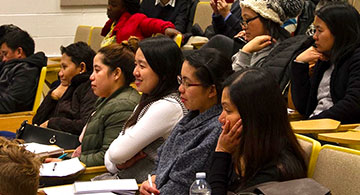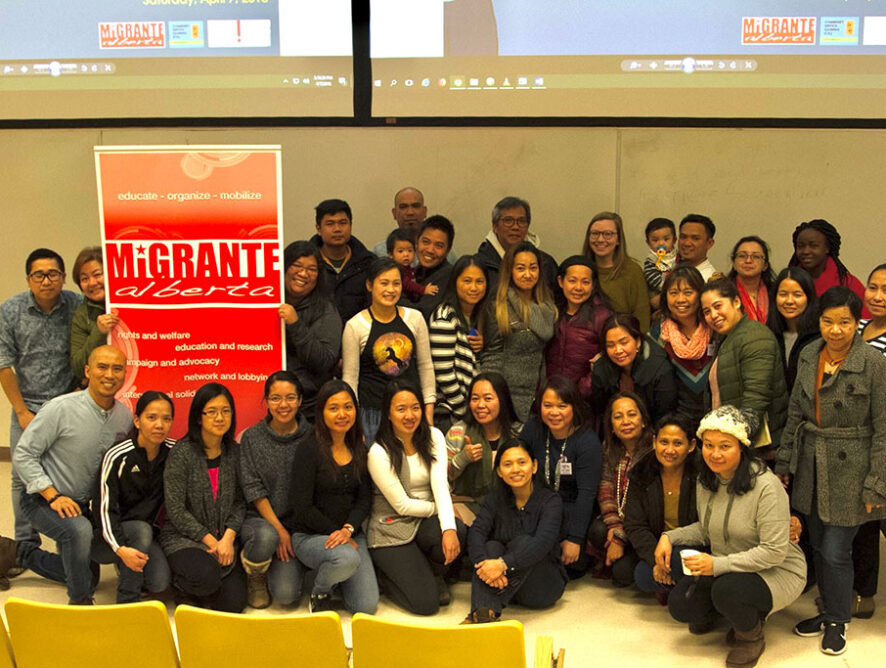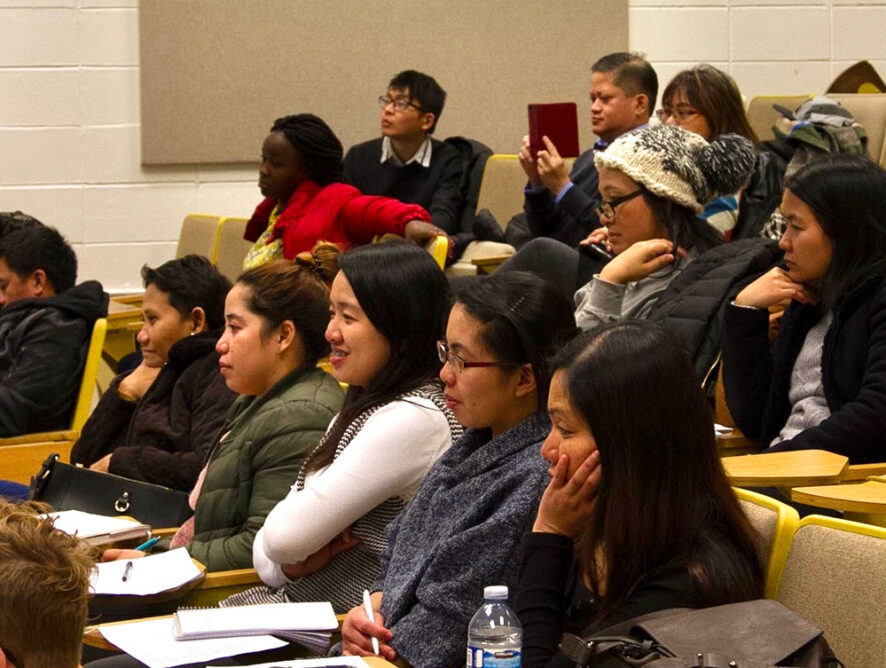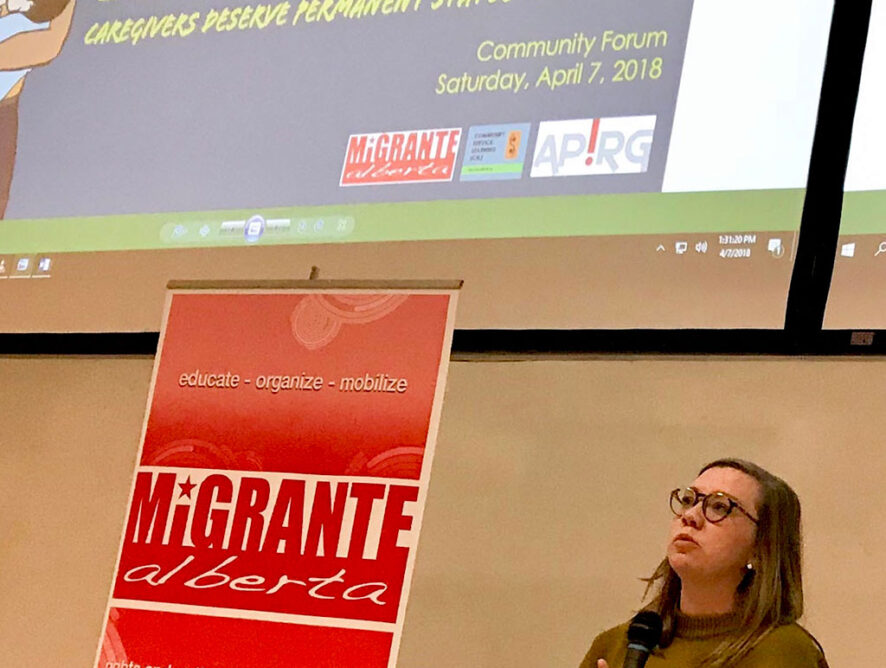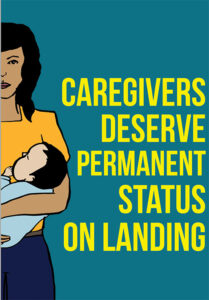 In my article last February entitled Who Cares for the Caregivers, I wrote about the upcoming review of the Caregiver Program by Ministry of Immigration. I also wrote about how this is creating panic among the caregivers and their concerns of not being able to apply for permanent residency.
In my article last February entitled Who Cares for the Caregivers, I wrote about the upcoming review of the Caregiver Program by Ministry of Immigration. I also wrote about how this is creating panic among the caregivers and their concerns of not being able to apply for permanent residency.
As the issue continues to trend and became a hot and sticky topic, I’m compelled to write about it once more with a little more history, analysis and what the Canadian community is doing about it.
For more than a century, Canada has depended on women from the global south to provide essential care for Canadian families. In the early 20th century, British and Western European women were employed to provide care. These women arrived with permanent status, settled permanently in Canada and became “mothers of the nation.” Since World War II however, migrant caregivers that have been recruited overwhelmingly from third world countries arrived with only temporary migrant status. In 1955, when permanent immigration was closed for most racialized peoples, caregivers came in with temporary status under the Caribbean Domestic Scheme. Another program from the beginning of 1973 called the Non-Immigrant Employment Authorization Schemes only granted temporary status to caregivers allowed into the country. They had no access to permanent residency and could only remain in Canada as long as they worked as caregivers.
Since the 1960s, the various incarnations of the federal Live-in Caregiver Program (LCP) have allowed Canadian families to hire foreign nationals to work as full-time caregivers in private households. For decades, the LCP has been a vehicle for affordable care for families with children, or persons with medical needs, including people with disabilities and the elderly. The demand for affordable caregiving services is expected to increase substantially in the coming years as Canada’s population ages.
Since 1981, an objective of the former Foreign Domestic Movement Program and subsequent LCP introduced in 1992 was to facilitate permanent residence for caregivers.
The LCP recognized the value in ensuring a pathway to permanent residence for caregivers, who perform critical work essential to the Canadian economy. It also recognized that many caregivers, once landed, go on to work in the health care field in Canada in occupations such as Home Care Aides and Licensed Practical Nurses. In addition, over the past four decades, caregivers of the program have suffered from the “two-step” immigration system that requires them to finish their employment contracts before being allowed to apply for permanent residency. This has led to profoundly damaging and lasting impacts on the physical and mental health of caregivers and their families. Years of family separation can cause intergenerational conflicts between caregivers and their children as well as family breakdown.
The LCP was eliminated by the Harper Government in November 2014 and replaced with a new branch of the Temporary Foreign Worker Program (TFWP). The rationale for the changes to the LCP on the part of the government was to “protect caregivers from abuse and reduce family separation.” However, the changes were ushered in following closed-door consultations that excluded caregivers and their advocates. The new program in effect increases worker insecurity and vulnerability to labour exploitation. Under the new scheme, the ability of caregivers to apply for permanent residence has been severely restricted while “tied” work permits have remained intact.
The two new pathways for permanent residency for caregivers, which are the caring for children class and the caring for people with high medical needs class, are each capped at a maximum of 2,750 applications that will be processed every year. New eligibility requirements relating to language and education for permanent residence were also introduced with the result that some caregivers who are qualified to work in Canada as caregivers are not eligible to apply for permanent residence.
Under the current Caregiver Program (CP), the mandatory live-in requirement has been eliminated and two new caregiver streams to apply for permanent residency were created -– the High Medical Needs Stream and the Childcare Stream. While we strongly support the removal of the mandatory live-in requirement, the change from the LCP to the CP has impeded migrant caregivers’ ability to apply for permanent residency while increasing worker precariousness.
First, because the CP was created under Ministerial Instructions, there is the mandatory cap of caregivers, I mentioned earlier who can apply for permanent residency each year under either the High Medical Needs Stream or the Childcare Stream. Second, new language requirements were imposed. Third, the CP requires that caregivers complete the equivalent of one year of Canadian post-secondary education. When caregivers’ credentials acquired outside Canada are not recognized, caregivers are required to enroll in post-secondary education in Canada.
The Coalition for Migrant Workers’ Rights, a national coalition for and by migrants said, “Caregiving work is without a doubt a core and growing part of Canada’s labour market and social Infrastructure”. “Without care work, the economy doesn’t work” they added. Instead of creating another pilot project that treats the need for care work as a private individual need, it is time to create a national care strategy that addresses the broad, public and enduring need for quality care for children, the elderly and people with disabilities. Many advocates believe that decent work and permanent status for the workers providing care giving labour must be the foundation for that care strategy. Migrant caregivers need a secure, permanent immigration status to be able to properly do their work of caring for children, the elderly and for people with disabilities with dignity and rights like any Canadian worker.
The Federal government called for submissions from Canadians as part of the process to review the Caregiver Program. Its deadline was on the 6th of this month. A joint submission initiated by an alliance of migrants based in Toronto was drafted and sent to the Ministry. It includes three main calls:
1. A comprehensive and transparent consultation process to reform the Caregiver Program;
2. anew Federal Workers Program – Caregiver Stream that provides caregivers with permanent status on entry and family unity; and
3. reforms to protect caregivers who are already in Canada and in the backlog to ensure that no one is left behind.
For a were held in different parts of Canada to raise awareness of the issues affecting the caregivers. A forum was held in Edmonton on April 7th that featured caregivers and speakers from other provinces. Repeated verbatim, Cynthia Palmaria of Migrante said that “It’s important to hold gatherings like this because not only it raises awareness but develop a call to action among our kababayans”. “We need to address the issues facing the people that are caring for our future generation. We need to start caring for the caregivers,” she added.


